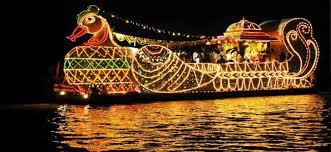Theppotsavalu : Performed With Ceremonial Idols & Decorated With Beautiful Rafts
Theppotsavalu : Also known as Raft Festival, A Significant celebration observed in renowned Hindu temples. During this festival, divine idols are splendidly paraded either in Pushkarini (sacred tank) or nearby canals, rivers, and ponds. The ceremonial idols are adorned with exquisite divine ornaments and vibrant flower garlands, accompanied by the resonant chants of Vedic scholars, devoted devotees, and the rhythmic beats of melatalas and madhyas. The revered deity is reverently transported from the sanctum sanctorum to the bathing place for the grand ceremony.
Subsequently, the ceremonial idols are placed upon a beautifully decorated raft adorned with mango leaves, flowering plants, banana leaves, and colorful flags. Under the guidance of the chief priests of the temple, various upacharas (ritualistic offerings) and reports are presented to the Lord while aboard the raft. The Raft ceremony serves as a momentous culmination of the festivities.
One such grand Teppotsavam takes place every year in Tirumala, at the Pushkarini of Lord Venkateswara. This five-day festival occurs during the auspicious period of Phalguna Purnami in the month of Chaitra. The tradition of conducting Teppotsavam prior to the full moon in the month of Falguna for Tirumala Srivaru continues to this day, commencing from Falguna Shukla Ekadashi.
The festival spans five days, culminating on the full moon day. Teppotsavam , meaning “boat festival,” involves the blessed deities being ceremoniously carried aboard a boat. In Tamil, it is called Tirupalli Odai Tirunal, while in Telugu, it is referred to as Teppa Tirunallu. The first day of this five-day program includes the worship of Lord Rama and Goddess Sita. On the second day, Lord Krishna and Goddess Rukmini are worshipped. The puja rituals commence on the third day with Troyodashi and conclude on the full moon day. During these three days, Sridevi and Bhudevi, along with the ceremonial idol of Malayappa Swamy, are beautifully adorned and worshipped on specially designed rafts placed in the Pushkarini.
Theppotsavalu & It’s Procession
The Teppotsavam festivities begin with a magnificent procession of the festival idols through the four Mada streets of the temple, culminating in worship at Srivari Pushkarini. Subsequently, the deities are gracefully placed upon the exquisitely decorated raft, and Lord Venkateswara embarks on three laps around the Pushkarini. On the third day, Sri Bhusametanga, bedecked in resplendent ornaments, is paraded through the streets before resting on a raft in Koneti.
Lord Venkateswara blesses the devotees by walking three times on the raft on the fourth day, five times on the fifth day, and seven times on the final day, all within the Pushkarini.
Devotees believe that the Lord bestows special blessings upon them during these Teppotsavam days, creating a profound spiritual connection.
Similarly, the Teppotsavam for Kanakadurgamma at the Kanakadurga Ammavari Temple in Vijayawada is celebrated during Navratri, particularly on the occasion of Vijayadashami. On the final day, a captivating rafting ceremony takes place in the Krishna River, where a beautifully adorned swan-shaped raft carries the divine goddesses for a majestic procession in the river. Thousands of devotees gather along the riverbanks, witnessing this breathtaking spectacle that leaves an indelible impression on their hearts and minds.
Also Read : Bottu Pettadam : Putting A Blob Consider As An Sacred & Holy Practice

